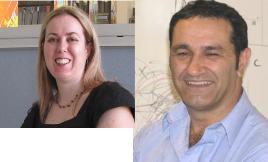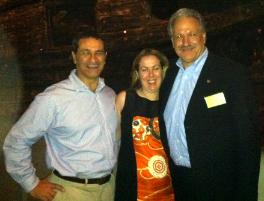Researchers mine data to predict commuter sleepiness
Published on 28 July, 2011
CQUniversity researchers Lee Di Milia and Naomi Rogers will outline factors predicting tiredness and sleepiness during a morning commute when they present at the forthcoming Queensland Mining Industry Health & Safety Conference, scheduled for August 21-24 in Townsville.
Predictive factors revealed by a detailed survey of drivers include: a sleep of less than 5 hours, working night shift, less than four nights of full sleep over a week, chronic sleepiness, high risk of sleep aponoea and working more than 55 hours per week.

Associate Professor Naomi Rogers and Professor Lee Di Milia, ready to present data in Townsville
Drivers who reported being 'sleepy' or 'tired' were involved in a series of incidents, including running off the road or crossing the centre line.
Professor Di Milia and Associate Professor Rogers are also contributing to a presentation about mine worker roster cycles and the issue of fatigue management during commuting.
Based on questionnaires filled out by coal miners and mine managers, the data demonstrates many mine-workers in Queensland drive long distances to and from work, with little or no rest breaks.
Hence, new approaches are needed to develop effective fatigue management strategies for communting.
The CQUniversity researchers will also report on sleep-wake patterns in Queensland mine workers, acknowledging that shiftwork affects sleep-wake timing and sleep quality, as well as waking capabilities.
Different roster schedules have different effects on sleep-wake patterns, so workers from four mines on four different rosters were studied for one roster cycle. Sleep-wake patterns were assessed using sleep diaries and small actigraph watches that detect movement.
Data will be presented to show the effects of different rosters on sleep-wake behaviour and sleep duration and quality. Results will be available for development of controls and management strategies.

Naomi and Lee meet with Dr Mark Rosekind from America's National Transportation Safety Board
Details about the conference are available via http://www.qrc.org.au/conference/
Meanwhile, Professor Di Milia and Associate Professor Rogers recently attended a conference in Sweden, where they had the chance to meet Dr Mark Rosekind.
Dr Rosekind is in charge of America's National Transportation Safety Board, which is charged with investigating all major air, road, rail and sea accidents. The Board works with federal agencies to put in place systems to prevent these accidents from reoccurring. Mark is a presidential appointment in recognition of his expertise in human factors. Prior to this appointment, he ran his own consulting company advising clients on human factors and earlier worked for NASA on fatigue in astronauts.

